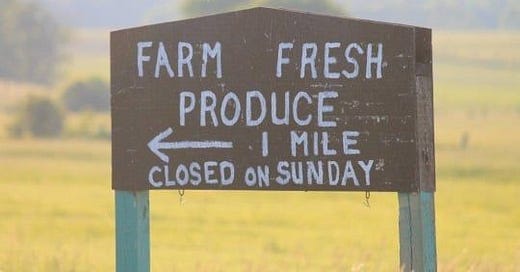What is the ROI on this baby’s birth?
What’s the dividend of this earth?
How much are your human organs worth?
There has long been a line of attack on the inhuman abstraction of industry, commerce, and bureaucracy, everyone from Tolkien to the Unabomber. But these attacks seem utopian. If you think the industrial revolution itself is the problem, like the Unabomber did, then any possible action is as futile as sending bombs through the mail to a random computer repairman. Short of wishing for and desiring mass death, which seems to partake of inhuman abstraction.
In today’s transmission we propose a new way of thinking about human organizations that both acknowledges but also limits the critique of industry, commerce, the market, and other abstract and impersonal organizations.
We then apply that model to the family farm.
The Crisis of the Family Farm
Family farmers are getting old and who will replace them?
Specific details vary, but everyone agrees on the main picture. (See here/here).
It's worse than just the average age approaching 60. 3.3+/- million farmers total 1.3 million over 65 837k 55 to 64 1.185 million under 54 Even the under 54 is skewed towards the older end. Who will be farming in 15 years?
Many farmers are retiring. Well, that happens. Demographics are down but there are still plenty of young people who would farm if they could.
Why can’t they? Because the farms cost too much.
Large corporations with extremely low cost of borrowing have gradually bid up the cost of farms until the averatge expected rate of return is in the neighborhood of 3-4%.
That is to say, if the farm costs a million dollars, a skilled farmer can probably net $30,000 a year from it apart from the costs of borrowing. Throw in another $30,000 for what their own labor would cost. But the costs of borrowing are going to be more than $30,000. The interest alone will probably be at least $60k.
The upshot is that a private person who wants to farm has to inherit the land at little to no cost, or have already made their money elsewhere. Neither of these are a formula for someone who is confident in their ability to farm taking over the operation.
We recently evaluated a small farm being offered at $750k. Using reliable data from our already existing operations in the area, we could do better than the nationwide average. We believe we could consistently clear $30k+ a year when all costs are accounted for. A bit less than 5% rate of return, for which we would have to work pretty hard. That rate of return assumes we work for free.
We are still mulling it over. If we do it, it won’t be a conventional commercial or investment decisions.
The Crisis isn’t the Cost
Which brings us to the real reason that in the next couple of decades or so most family farms are going to pass into the hands of agribusiness.
The crisis is not that most farmers are old and planning on retiring.
The crisis is not that on the commercial markets farms cost a lot in proportion to expected rate of return.
The crisis is not that mortgage costs exceed returns for a normal person’s costs of borrowing.
The crisis is that most farmers and farm families are confused about what kind of operation they have.
Human operations and organizations run on a spectrum from completely arms-length, commercial, impersonal, and abstract at one end, to generational and personal at the other. Financial trading is at one pole, the generational family is at the other.
Human operations and organizations run on a spectrum from completely arms-length, commercial, impersonal, and abstract at one end, to generational and personal at the other. Financial trading is at one pole, the generational family is at the other.
Here is the crisis. Older farmers want to keep their operations in the family, but they want the family members to pay them financial trader rates for it. Or at least something the ballpark. Their heirs, conversely, often want to keep the family farm going but when they look at what the land is “worth” in financial trading terms they decide it makes more sense to sell it off and split the money. Because all three kids getting 20,000/year in the stock market is better than one of them getting 80,000 working hard on the farm and the other two getting an annual fruit basket and a place to visit and for their kids to work. This is financial trader analysis and is correct in financial trader accounting. In family accounting it is a terrible decision. You can’t have generational assets valued at windfall market prices.
A retiring farmer who wants to keep the farm as a family operation (whether his own family or another family he can pass the torch to) has to make a conscious decision to use family accounting.
When a father pays his kids to do a task, it is mostly irrelevant how much time and money he is saving by not hiring a contractor.
When a mother braids her daughters’ hair, it is bad math to compare the cost of hiring a hairdresser versus how much extra she could earn if she spent that extra hour in the office.
When parents save for their children’s education or to help their children have grandchildren, it has nothing to do with nothing whether or not the parents are going to see a financial return on investment.
All enterprises have to operate in the market to a degree. This is inevitable, and the inevitability goes both ways: all rational schemes on the financial trader/corporate/bureaucratic end of the spectrum inevitably founder on the messiness of human existence and human motivations. A family/personal enterprise still has to make a profit in the long run and a market/abstract organization still can’t treat people like widgets in the long run. But that truth doesn’t belie that these are two different poles of organizational existence and what is appropriate for one could be wildly inappropriate for another.
So the first thing a farmer has to decide is, is he running an agribusiness, or is he running a family farm. If the former, by all means, sell at the market price. In fact, why wait until retirement? Sell out now. You will command a fine price and can invest the money. With your skills you will be able to get a fine job. If you enjoy the farming, you can almost certainly get hired on as a farm manager somewhere. Maybe even on the place you just sold.
But if you are running a family farm, then what you are looking for is someone capable of running the place, or capable of being taught to run the place, at a price they can afford to pay and you can afford to accept. Essentially, you want someone to pay for your retirement. That is reasonable and fair.
And once you have decided, you have to orient your operation that way usually well before you retire. Begin with the end in mind.
Case study 1:
Our cousin just inherited the family farm. It went like this. His family has a large farming operation started by his grandfather. His grandfather worked until the day he died, along with various sons and relatives. Two of his sons worked with him and wanted to farm it so they inherited it. At various points, various of their children and nieces and nephews worked the farm. For the last decade or more, it was principally two of their sons each. At various times, when conditions permitted, they expanded their operation. In recent years, my cousins’ father and uncle have worked less and less and the set of four cousins have basically taken over operation. Last year they formalized it. The legal details are complex, but in reality what happened is they split the farm into two operations, with each set of cousins getting a half. They have a formula for sharing capital-intensive equipment that works because they have a lot of experience with the equipment’s costs and uses, and because they trust each other. In return the older generation gets sufficient income every year they and their spouses live. They also provide advice and expertise and are still helping out some especially with the back end.
Case study 2
As described in Gregory Jeffers incredibly interesting book the Prosperous Homesteader, the Mennonites of Kentucky work like this. The older children work in the economy to get the cash to buy a small farm, with their parents’ help. The youngest son inherits the farm. He builds a small place for his parents to move into next to the main home, while he and his new family take over the main house. He supports the parents and they help him with the farm to the extent they can.
Case study 3
A businessman we know—he’s a Carwash King—has five children now grown. He told them growing up that any business proposal they came to him with he would finance if they had some kind of track record in that area, which either meant some work experience or starting small and proving themselves before launching out. He and his wife then worked out a deal with each kid depending on their specific business proposal. In the main, they negotiated a system where he and his wife provided the bulk of the financing and retain majority ownership with enough return on capital to cushion their own operations but at rates that are probably well below market, giving the kids a great chance to succeed at their business, which they all have (including the sons-in-law). Several of them are in completely different businesses, one is integrated with the businessman’s own more or less. They occasionally use their majority ownership to veto a radical change of strategy hat they think unwise but that’s about it. When they die, the kids’ take complete ownership.
This is family accounting.
Do you see your own family as a generational commitment? Buy your kids the very first natalist children’s book, Yes Our Family Is the Best. Customizable. We have heard uniformly good things from the buyers.
Bulk discounts for camps and schools.







